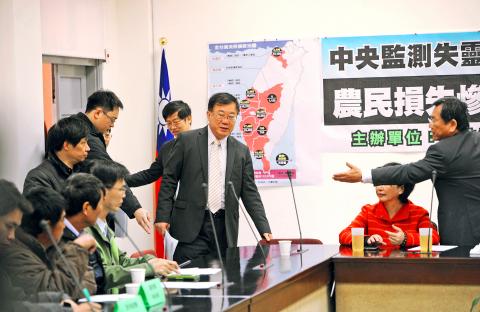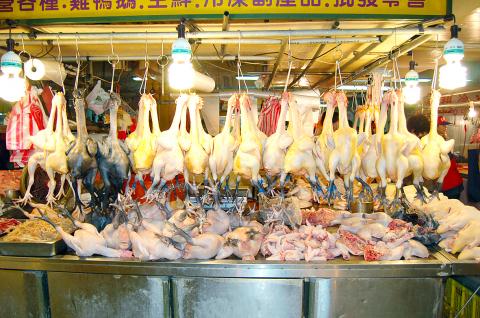Avian influenza has been confirmed on two farms in Pingtung County’s Wanluan Township (萬巒) and all 220,000 birds on the two farms will be killed today, the Council of Agriculture said yesterday.
An organic farm raising about 80,000 chickens for meat was hit by the highly pathogenic H5N8 bird flu strain, while samples from an egg farm tested positive for the H5 subtype, the council said.
Both farms are run by Dawushan Livestock Products Co, the same operator that reported the first case of H5N2 in Pingtung this year on Jan. 9.

Photo: CNA
In addition, the results of tests on the carcasses of three light-vented bulbuls (Pycnonotus sinensis) found near a slaughterhouse in Miaoli County’s Jhunan Township (竹南) last week showed the trio had the H5N3 strain — the fourth and most recently detected virus strain to be found in Taiwan during the current bird flu outbreak.
The Pingtung case was the second to be confirmed among chickens, after the newly discovered H5N2 strain was found on a broiler farm in Changhua County’s Shengang Township (伸港) on Sunday, while the bulbuls were the first birds known to be affected by the new bird flu strain.
The council yesterday ordered all slaughterhouses, poultry markets and farms nationwide to cease operations until Thursday so they could be thoroughly disinfected — including all vehicles and cages.

Photo: Chen Wei-jen, Taipei Times
Meanwhile, Environment and Animal Society of Taiwan (EAST) chief executive Wu Hung (朱增宏) said the council’s response was too slow, and that it should have suspended operations at such facilities after the first outbreak was reported almost three years ago on a layer chicken farm on Pingtung’s Dawushan (大武山).
A survey conducted by EAST found local authorities lack a standard culling method, Wu said, with some using chloral hydrate as an anesthetic before killing the fowl, while others kill the birds by freezing them with dry ice or suffocate them by stuffing them into bags.
The US of Department of Agriculture has banned the use of chloral hydrate during culls because it is a weak anesthetic, while freezing the animals with dry ice causes a painful death, Wu said.
Council of Agriculture Minister Chen Bao-ji (陳保基) said the council would reassess the culling methods used by local agencies and adjust them if necessary.
Despite the increasing number of bird flu outbreaks among chickens, Animal Husbandry Department division head Chiang Wen-chuan (江文全) said the impact on the nation’s poultry flocks has been limited, with about 410,000 chickens affected, or about 0.5 percent of the nation’s annual supply.
He said that geese have borne the brunt of the outbreaks, with about 416,000, or 30 percent of the nation’s total, culled as of yesterday morning.
The council’s latest statistics show that of the 274 facilities sampled so far, 239 tested positive for avian flu strains and culls have been conducted at 130, putting the total number of poultry affected by the outbreaks at about 528,000.
In related news, Yunlin County Agriculture Department Director-General Chang Shih-chung (張世忠) told a news conference in Taipei that his agency is desperately short of workers, as it receives more than 20 reports of possible infections per day and about 60 percent of the total number of geese in the region are on the council’s watch list.
The avian flu outbreak has swamped the three rendering sites in the county, which reached their capacity several days ago, Shih said.
Duck Association Taiwan deputy director-general Lin Chin-fa (林金發) said that 90 percent of his geese had died and it looks as if the rest will die soon.
Chen said the current outbreak is the largest in the nation’s history, and that the government would ease its compensation rules for farmers affected by the epidemic.
It will be at least three months before farms hit by the bird flu outbreak can resume operations, Chen said.
He also said local authorities would act swiftly to inspect goslings and urged members of the Goose Association Taiwan to help.

Chinese Nationalist Party (KMT) Chairman Eric Chu (朱立倫), spokeswoman Yang Chih-yu (楊智伃) and Legislator Hsieh Lung-chieh (謝龍介) would be summoned by police for questioning for leading an illegal assembly on Thursday evening last week, Minister of the Interior Liu Shyh-fang (劉世芳) said today. The three KMT officials led an assembly outside the Taipei City Prosecutors’ Office, a restricted area where public assembly is not allowed, protesting the questioning of several KMT staff and searches of KMT headquarters and offices in a recall petition forgery case. Chu, Yang and Hsieh are all suspected of contravening the Assembly and Parade Act (集會遊行法) by holding

PRAISE: Japanese visitor Takashi Kubota said the Taiwanese temple architecture images showcased in the AI Art Gallery were the most impressive displays he saw Taiwan does not have an official pavilion at the World Expo in Osaka, Japan, because of its diplomatic predicament, but the government-backed Tech World pavilion is drawing interest with its unique recreations of works by Taiwanese artists. The pavilion features an artificial intelligence (AI)-based art gallery showcasing works of famous Taiwanese artists from the Japanese colonial period using innovative technologies. Among its main simulated displays are Eastern gouache paintings by Chen Chin (陳進), Lin Yu-shan (林玉山) and Kuo Hsueh-hu (郭雪湖), who were the three young Taiwanese painters selected for the East Asian Painting exhibition in 1927. Gouache is a water-based

Taiwan would welcome the return of Honduras as a diplomatic ally if its next president decides to make such a move, Minister of Foreign Affairs Lin Chia-lung (林佳龍) said yesterday. “Of course, we would welcome Honduras if they want to restore diplomatic ties with Taiwan after their elections,” Lin said at a meeting of the legislature’s Foreign Affairs and National Defense Committee, when asked to comment on statements made by two of the three Honduran presidential candidates during the presidential campaign in the Central American country. Taiwan is paying close attention to the region as a whole in the wake of a

OFF-TARGET: More than 30,000 participants were expected to take part in the Games next month, but only 6,550 foreign and 19,400 Taiwanese athletes have registered Taipei city councilors yesterday blasted the organizers of next month’s World Masters Games over sudden timetable and venue changes, which they said have caused thousands of participants to back out of the international sporting event, among other organizational issues. They also cited visa delays and political interference by China as reasons many foreign athletes are requesting refunds for the event, to be held from May 17 to 30. Jointly organized by the Taipei and New Taipei City governments, the games have been rocked by numerous controversies since preparations began in 2020. Taipei City Councilor Lin Yen-feng (林延鳳) said yesterday that new measures by